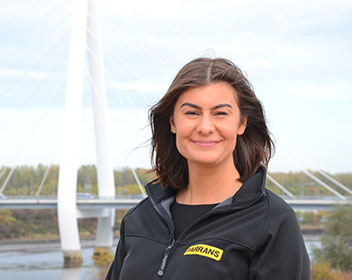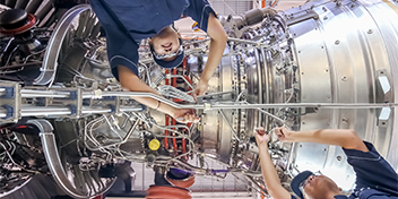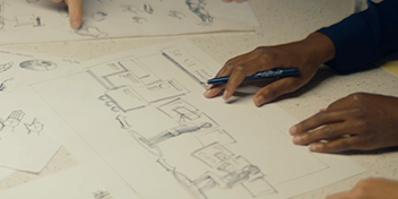What inspired you to become an engineer or pointed you towards an engineering career?
After originally applying to study biology at university I visited Lesotho at age 17. Over 80% of the country lies above 1,800 metres (5,906 ft) and Lesotho has the highest low point of any country in the world, meaning it is very close to the sun and can get hot during the day, but due to the altitude it gets very cold when the sun goes down. While I was there and travelling in the mountains, I saw there were habitats that used corrugated iron sheets as their primary building material, which would heat up from the sun during the day but cool down very rapidly at night. I questioned why such an unsuitable material would be used and when I got home, I investigated different housing types and discovered the power of civil engineering. My passion for development engineering and making a difference in the world was then born!
Please describe your role or position within your workplace.
My job varies! I have previously worked as a contractor, working on sites such as the £118million Northern Spire Bridge, schools, electric vehicle battery plants, petrochemical plants and a shopping centre extension and refurbishment. In these roles I gained a wide experience in health and safety, quality, project management, along with great technical knowledge of things like concrete, drainage, roads and precast elements amongst many other things!
I spent one year with a pre-construction department of a large contractor and got to see the effort that goes into pricing and tendering for a role as an Estimating Assistant and Bid Manager. Wearing all these hats and gaining all this experience gave me a really solid grounding and led me to my current role at Design ID, a medium size civil and structural engineering consultancy which prides itself on taking challenging jobs.
I am a Principal Engineer, which means I manage teams and projects on a day-to-day basis. I generally get the tricky and bespoke jobs that allow me to put my skills into practice. I have done everything from working on Crossrail station refurbishments, designing a play park, to managing liaison with railway authorities on large developments in London and Newcastle. I hold senior management positions within the company, including Health and Safety Lead. I also drive our training schemes and advise on company procedures and policies to ensure we have high standards.
I am also Project Manager of The Big Bridge Scheme, a 13m long by 3m high model cable stayed bridge kit that travels to schools across Northern Ireland to allow primary school aged children to build the bridge in teams to promote engineering, construction, and Science, Technology, Engineering and Mathematics (STEM) to students. This in itself is almost a full-time job, but hugely rewarding! I try to get support and funding to run the scheme, train staff to deliver sessions and run the day-to-day administration involved in such a complex scheme, while trying to decide where the bridge is best used to promote engineering the best.
Can you describe a typical working day?
Every day is different. I could be visiting a construction site of residential buildings in London, walking along the clifftops in Northern Ireland supervising a coastal bridge crane lift, or in the office leading training or completing project work. I am very lucky that my role allows me to use all my passions and skills. As you become more senior you spend a lot of time in meetings, and it is a skill to protect your time and ensure that you allow enough time for other work! My team is very collaborative, and we bounce ideas off each other and use everyone’s skills and I really enjoy this part of my work.
Are there any particular challenges or unusual aspects to your role?
A lot of my jobs are very technical and involve fast thinking, critical analysis and problem solving. However, this is what makes it fun and rewarding! Wearing a lot of different hats and holding several roles, it is sometimes difficult to prioritise and balance the demands across so many vastly different areas. Time management is something I have been working on recently.
Dealing with people, ensuring that everyone in your team is well utilised and happy in their role is a responsibility I take very seriously and managing different aspects of this is a challenging aspect of my role. Our team is a very young one and it has been interesting to adapt company policies to the ‘next generation’ of engineers and see the differences in ways of working. I am constantly trying to improve my skills in this area, including taking a leadership qualification this year.
What do you find most enjoyable about your job?
I love the challenges and being able to think critically to solve problems. I really enjoy working in a team and I love the variety and the freedom to work on projects that hold interest to me and suit my skill set. I am very fortunate to be allowed this freedom. I think it is also important to have a mix of office work, working from home and travel to construction sites. Variety is key!
Is there a great professional achievement or high-profile accomplishment that you would like to tell us about?
Being part of the core team to build the Northern Spire Bridge in my hometown of Sunderland and part of the team that named the bridge was a really special time that will forever stand out as a career high. It has been wonderful to see how the city has developed around this critical piece of infrastructure. The reason I got into civil engineering was to enact change!
I am very proud to have been fortunate enough to have won several awards throughout my career. Most recently in 2023 I was named Construction News Rising Star in a competitive field. In 2020 I was named the Royal Academy of Engineering Young Engineer of the Year and in 2018 I was a finalist in the Institute of Engineering and Technology Young Women Engineer of the Year Awards. Each of these experiences has allowed me to meet some inspirational people and has inspired me further in my field. Each of these has recognised my technical ability as an engineer as well as my dedication to social value schemes and development engineering.
I am also proud of my accomplishments and journey in social value and the thousands of students reached. Starting with the launch of the Inspire Competition in 2015 (still running to date!), creating the Zombie Apocalypse Workshop, leading the team that created the Institution of Civil Engineers (ICE) award winning digital game CityZen, and now setting up The Big Bridge. Each of these has hopefully had an impact on large numbers of students and encouraged them to consider engineering as a career.
What contributed to your decision to become professionally registered?
It felt like a professional milestone that had personal meaning to prove that I had the skills and knowledge required to hold the title. I was very proud to achieve Chartered Engineer status as this proves a level of competence and that you are a well-rounded engineer.
In what ways has registration benefitted your career?
Being chartered means you can progress to more senior levels in your organisation and commands respect from your peers as it demonstrates a level of competence and commitment.
How does your employer benefit from your professional registration?
Professional registration enables me to manage projects and liaise with clients. My registration gives clients confidence that they are dealing with a competent and experienced professional person who will do a great job!
Is there any advice you would pass on to someone considering professional registration?
Go for it! It might seem daunting at first but keep at it and it is worth it. Break down the process into manageable chunks so you can plan out what you want to achieve and when.
Where do you see yourself in your career in five years’ time or what are your future ambitions?
This is a tough one to answer as there are so many workstreams I am interested in. I am particularly passionate about humanitarian and development engineering, having volunteered in Malawi and Kenya previously and I would like to grow my experience by working in projects in these areas.
Outside work, is there any activity you enjoy doing in your spare time that relates to engineering? For example, do you participate in mentoring, volunteering or membership of other engineering groups?
I have been heavily involved with ICE since university and have held several committee roles that particularly focus on outreach and social value. At present a lot of my time is dedicated to social value – having set up the social enterprise, The Big Bridge in 2023.
Do you identify as disabled, or as a member of a minority or under-represented group? Would you like to comment on what impact or influence you feel this has had upon your career?
I am very proud to be from the Northeast of England and to be a female in a traditionally male-dominated industry. I have dedicated my career to inspiring the next generation of engineers, particularly female students and to improving the industry so that it is a more welcoming place for those not traditionally represented in the industry. I have seen great changes in the 12 years I have been working but we still have some way to go to fill the current skills gap.









